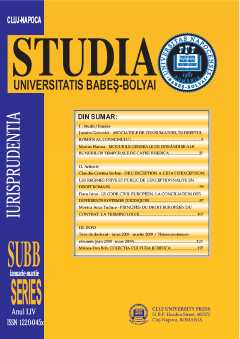PARADOXURILE JURIDICE ALE BUNEI-CREDINŢE ÎN CONTRACTELE DE CONSUM. PRIVIRE COMPARATIVĂ ÎNTRE SISTEMUL CONTINENTAL ŞI SISTEMUL AMERICAN
THE LEGAL PARADOXES OF GOOD FAITH IN CONSUMER CONTRACTS. A COMPARATIVE VIEW BETWEEN THE CONTINENTAL SYSTEM AND THE AMERICAN SYSTEM
Author(s): Anca RuenSubject(s): Law, Constitution, Jurisprudence
Published by: Studia Universitatis Babes-Bolyai
Keywords: good faith; unfair contract terms; excluder analysis theory; foregone opportunities theory; unconscionability doctrine; equity; consumer law; common law.
Summary/Abstract: The legal paradoxes of good faith in consumer contracts. A comparative view between the continental system and the American system. Consumer world: an evergoing struggle for contract position supremacy between the merchant and the consumer, a game which almost always has a default winner, the merchant, who naturally assumes the „privilege” of drafting the legal document and subsequently inserting contract terms that might be in his sole advantage. While the American legal hypostasis of consumerism embodies an economic approach of this phenomenon and, hence, the consumer contracts are reigned, by what we called a „mercantile type of affection”, the continental hypostasis depicts a more morally inclined type of contractual relationship between the merchant and its consumers. Although we are discussing about a „contract”, a concept which, under continental law, automatically implies the idea of liberty, consumers often find themselves thus trapped in a legal paradox: on one side, they are supposed to have full negotiation powers, but on the other side, by adhering to such a contract, they adhere to potential unfair terms, which, allegedly should be controlled via the good faith doctrine, a universal panacea, a flawless moral weapon that should be able to transform the consumer, in an ideal legal paradigm, from being hunted into being the hunter. Nonetheless, good faith, as we will demonstrate, is not and cannot be functioning, not even existing in the same way in all legal systems, because not all of these necessitate the concept itself, mainly due to the fact that they have had a completely different evolution of the consumer contractual context than the continental law, qualifying good faith as a mere legal mimicry, rather than a genuine concept, the American common law being our lead example in this demarche.
Journal: Studia Universitatis Babes Bolyai - Iurisprudentia
- Issue Year: 56/2011
- Issue No: 3
- Page Range: 41-76
- Page Count: 36
- Language: Romanian

